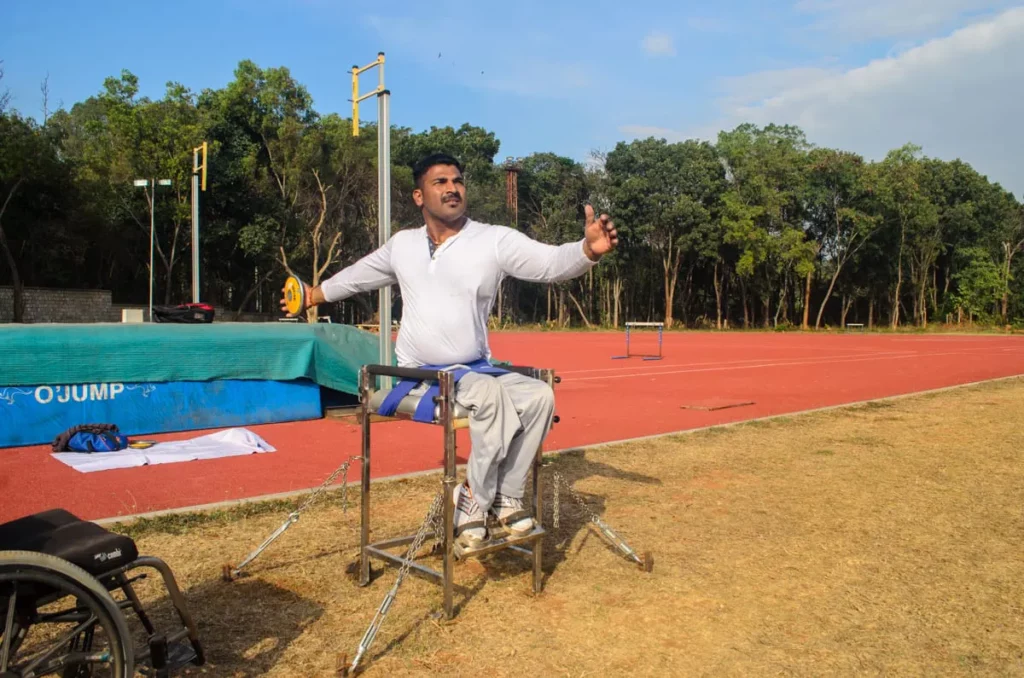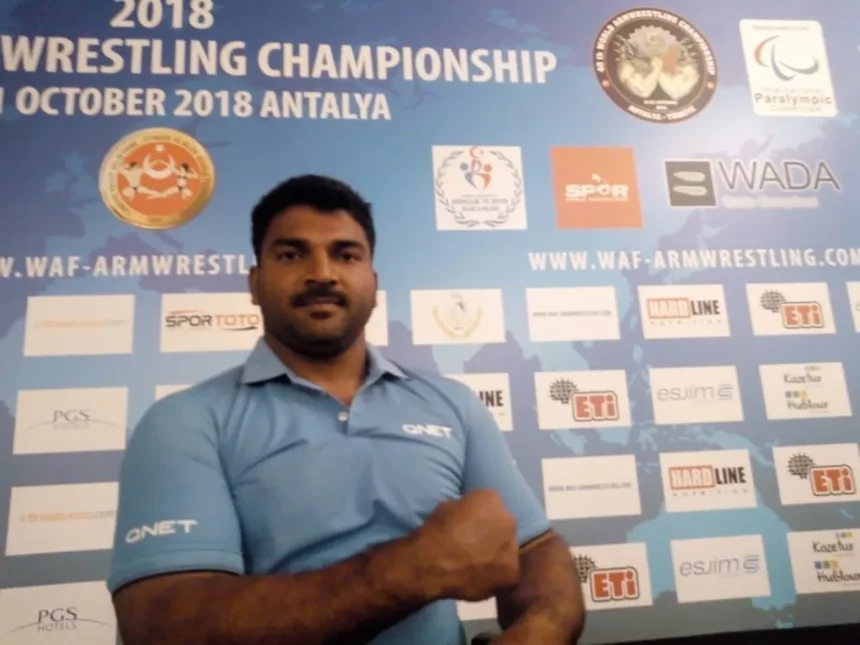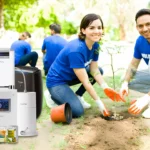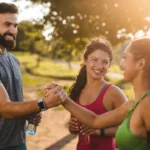Sandesha BG earns top 5 finish at World Para-Armwrestling Championship in Antalya, Turkey
Heroes, some people believe, are made, not born. These heroes treat strife as opportunity and setbacks as learning experiences. Para-athlete Sandesha BG is among them. Overcoming struggles through sheer endurance, commitment, and inspiration, Sandesha has found ways not just to survive but thrive in the face of strife. Losing his legs to a bout of polio at the age of one didn’t come in the way of him pursuing and excelling in sports and representing India at the world stage. His haul of medals and accolades is getting richer with by the year.
Now, nearly 15 years into his sporting career, Sandesha has notched up a remarkable list of accolades. Right at the start of his career, in 2004, Sandesha won first place in the shot put at a World Disabled Day event in Shimoga. He has since earned honours in bodybuilding, sitting volleyball, discus throw, and javelin in competitions both national and international. While the shot put remains his strength, he secured first place in the event at the 7th National Games for the Disabled in Chennai in 2013, it is his multi-disciplinary success that makes Sandesha a para-athletic icon. In 2014, BBMP (Bruhat Bengaluru Mahanagara Palike), the country’s fourth largest municipal corporation, honoured him with the Nadaprabhu Kempegowda Award.
At QNet, we believe in empowering people like Sandesha who have the drive to achieve their dreams and were pleased to support his participation in the 31st World Arm Wrestling Championship held last month in Antalya, Turkey.
Here, he reached yet another milestone, going up against the best in the world and earning an impressive top-5 finish.
We spoke with the athlete on his experiences at the championship, his incredible journey so far and the next goal on his list.
(Parts of the interview have been edited for clarity)
What did you cherish most about your experience at the World Championship? Tell us a bit about that.
First, I would like to thank QNet for making my participation possible. This event was special for many reasons. While I’ve made my name in the shot put and discus throw, arm wrestling is a sport that has caught my attention over the past few years. I have competed in championships before, but the event in Turkey was like none other. To compete with the world’s best in the sport and then finish in the top 5 (he earned 4th and 6th place in the left and right-handed competitions respectively) was an incredible feeling. I also now have a real sense of the work it takes to be a world champion. Going from not knowing where my next meal is coming from to competing on the global stage is an experience that cannot be expressed in words.
Watch Sandesha defeat Russia’s Ilfat Imamiev on his way to a 4th place finish at the 2018 World Para-Armwrestling Championships.
Your achievements gain context when we understand your challenges. What was your life like growing up?
I grew up in an agriculture-focused household in Chikmagalur’s Koppa Taluk. We didn’t have much money. It was a different world altogether. A childhood bout of polio meant that I lost the use of both my legs. I was one year old. For a large part of my early days, I was confined to one room and didn’t move around much. Everyone assumed that I had to be resigned to a certain quality of life because of my disability. It was a very frustrating experience. In spite of this hurdle, and maybe even because of it, I found that I had a fondness for sports and games. When I joined boarding school in the 5th standard (aged 10), I started to develop a real fire for proving myself. I decided that I wasn’t going to let my circumstances determine my fate, my response to them would.
How did your career in sports begin?
Well, I didn’t play any sport until I was 15-16 years old. Moving was a challenge, and I had no dreams of being an athlete. I would crawl everywhere. There was no other way to get around without someone’s help. When I moved to Shimoga for higher education, the Dean gifted me a tricycle so it would be easier to navigate the campus. It was a blessing to be able to move around freely without assistance. I just wanted to get a good education and find stable work, but life had more in store for me.
One day, the sports coach spotted me around campus and suggested that I take up bodybuilding. He said that he felt I had built up natural strength and this would be a distinct advantage. At this point, I had never even thought of doing something like this. With nothing to lose, I picked up a dumbbell and then I was hooked! State success followed regional success, and soon I was also playing other sports like wheelchair volleyball.
That is incredible. How did you go from there to competing seriously at the national and international level for over 12 years?
It wasn’t a straightforward route. College gave me my first exposure to a competitive sport, but then I moved to Bengaluru for my MBA. Here, I was overwhelmed by the change in environment and also by my lack of financial resources. It came to a point where I couldn’t eat every day because I didn’t have the money. Thankfully, after I finished my course, I found a job at Thomson Reuters as a content analyst. I was now able to support myself and fund my training. Once this rhythm was established, I started to push on in my sporting career. Pride and a desire to prove myself are my greatest motivators. I want to bring success to my state, my country, and para-athletes everywhere. These efforts have paid rich dividends, and I am humbled to have received recognition for my achievements.
How did you start playing other sports?
Once I realised that strengthening my body allowed me to compete, to do my nation proud, and to feel truly alive, it was the obvious move. I had built up upper body strength and flexibility, which lent itself well to a variety of sports. It also helped that I have been a multisport athlete since the start of my career. In 2004 I won first place in the shot put at a World Disabled Day event in Shimoga. Bodybuilding was an equally important part of my training, and I had several top-three finishes over the next few years in many state and zonal competitions.

You are competing in various disciplines at the highest level. How do you cope with the demands in training and the differences in movements?
It is essential for any athlete to build a solid foundation of strength and conditioning. That forms the basis for all success on the field. Then it’s just a matter of doing adaptive training and immersing yourself in the mechanics of every sport.
You are an inspiration. What is your message to other para-athletes?
Thank you. I have a message. It’s not for people who face particular challenges, but for everyone. I am incredibly grateful for my ability and success, but I am an exception. There are thousands of people, millions even, who are suffering in silence, locked away from what the majority sees as a normal life. To the people who are suffering, I say ‘ask for help’. No one will notice your struggle until you speak up and once you do, people will come forward to help. It’s equally important to offer help to those less fortunate than you. It is not their fault or a deserved fate. Everyone should have the right to access happiness.
How would you describe the state of para-athletics in India?
It needs much improvement. There is still no world-class facility for para-athletes in the entire country. The government needs to do more to support para-athletes. We have the talent to make India proud, and that talent must be allowed to flourish.
What is the dream, Sandesha? What keeps you going?
I am an athlete. The ability to train and compete every day in a bid to make my country proud is my dream, and I am fortunate to be living it. The desire to get better on the field and fly the Indian flag high on the world stage fuels me every day. My next goal is to compete at the 2020 Summer Paralympics in Tokyo. A gold medal at the event would be a dream come true. Moreover, I am confident that with adequate support, my commitment and talent will give me a chance to achieve this goal.
What is your message to companies considering athlete sponsorships?
I would urge companies and other organisations to seek out people with the desire and discipline to succeed. Help them. Even after winning the recognition I have, support remains a challenge, and I am grateful to companies like QNet and my employer for their continued assistance. Para-athletics is competitive. The training is intense, and the competition is fierce. Our athletes can compete but need to be given a chance. I want to be in a position to empower other athletes.








